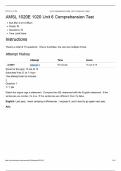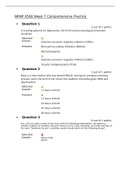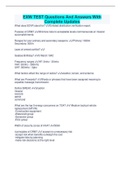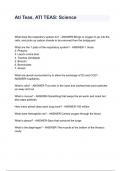Summary Financial Statement Analysis and Valuation lecture notes
MSc Accountancy and MSc Finance, Tilburg University
Contents
1. Introduction
○ Financial models to assess future performance
2. The Core Value Drivers
○ The residual income model
○ Profitability
○ Investment / growth
○ Risk
○ Profitability and growth interact
○ A common analysis structure via financials
3. Understanding the Business
○ What information do we need?
○ Business strategy
○ Using financials to understand a business
○ Accounting distortions
4. Ratio Analysis
○ The enterprise value perspective
○ The advanced DuPont decomposition
○ Analyzing is comparing
5. Information Collection
○ The importance of high quality data
○ Analyzing means comparing
○ Focused information collection
○ Firm initiated information
○ Firm external information
○ Qualitative vs quantitative information
6. Forecasting
○ Setting up the model
○ Structured forecasting
○ Slight tangent: connecting the dots to other lectures
○ Forecast horizon
○ Discipling the terminal value
7. Valuation
○ Full valuation models
○ Cost of capital
○ Multiples valuation
8. Capita Selecta
○ Wealth transfers in stock transactions
○ Scenario Analyses
, 1. Introduction
1.1 Purpose of this chapter
Financial analysis → support decision-making
process
1.2 Financial models to assess future performance
Decisions based on financial analysis:
● Investment decisions
○ markets to enter
○ acquire another firm
● Strategic decisions
○ internal resource allocation
● Lending and investment decisions by banks
All these decisions have expected future performance of the analysis target as input
The value of a firm is a function of the expected future profitability
● resource allocation decisions depend on which alternative is more likely to provide
the highest expected future return on investment
Future performance is highly uncertain, therefore decision makers need to assess the
expected future performance and also how uncertain these expectations are.
Any assessment of future prospects begins with an in-depth assessment of the current
economic situation
The key difficulty is devising a model that simplifies the main drivers of a firm’s business
model enough to be useful and focus on drivers for which high-quality data can be
collected. (also in time and within budget parameters)
, 2. The Core Value Drivers
2.1 Purpose of this chapter
Core value drivers that focus and anchor an equity valuation analysis:
● return-on-equity (ROE)
● investment growth (gi )
● risk / cost of equity capital (r)
2.2 The residual income model
The starting point for any valuation is the Dividend Discount Model (DDM)
Just like any other investment, a firm should be worth the present value of the expected cash
receipts it will provide to its owners (E0 [...] stands for “expectations formed in period 0 about
the term in square brackets”)
Dividends reflect the disbursement of funds, rather than the performance that created the
ability to disburse funds in the first place. so not a good basis for firm value
One of the main connections between the income statement and the balance sheet is
earnings
● The book value of equity represents the claim of the firm owners to the company’
assets
○ Earnings represent additional resources generated during the period
between the two dates on which the balance sheet was recorded
○ Dividends reflect the outflows of funds to owners
● Thus, the change in owners’ claims to resources (the change in book value of equity)
equals earnings minus dividends
● The residual of earnings minus dividends is also often called reinvested earnings
, This intuition is encapsulated in the so-called clean surplus relation:
(2.4)
To get an even clearer picture of what determines firm value, the RIM (residual income
model) can be further reformulated to express value as a function of return-on-equity, book
value of common equity, and cost of equity capital.
MSc Accountancy and MSc Finance, Tilburg University
Contents
1. Introduction
○ Financial models to assess future performance
2. The Core Value Drivers
○ The residual income model
○ Profitability
○ Investment / growth
○ Risk
○ Profitability and growth interact
○ A common analysis structure via financials
3. Understanding the Business
○ What information do we need?
○ Business strategy
○ Using financials to understand a business
○ Accounting distortions
4. Ratio Analysis
○ The enterprise value perspective
○ The advanced DuPont decomposition
○ Analyzing is comparing
5. Information Collection
○ The importance of high quality data
○ Analyzing means comparing
○ Focused information collection
○ Firm initiated information
○ Firm external information
○ Qualitative vs quantitative information
6. Forecasting
○ Setting up the model
○ Structured forecasting
○ Slight tangent: connecting the dots to other lectures
○ Forecast horizon
○ Discipling the terminal value
7. Valuation
○ Full valuation models
○ Cost of capital
○ Multiples valuation
8. Capita Selecta
○ Wealth transfers in stock transactions
○ Scenario Analyses
, 1. Introduction
1.1 Purpose of this chapter
Financial analysis → support decision-making
process
1.2 Financial models to assess future performance
Decisions based on financial analysis:
● Investment decisions
○ markets to enter
○ acquire another firm
● Strategic decisions
○ internal resource allocation
● Lending and investment decisions by banks
All these decisions have expected future performance of the analysis target as input
The value of a firm is a function of the expected future profitability
● resource allocation decisions depend on which alternative is more likely to provide
the highest expected future return on investment
Future performance is highly uncertain, therefore decision makers need to assess the
expected future performance and also how uncertain these expectations are.
Any assessment of future prospects begins with an in-depth assessment of the current
economic situation
The key difficulty is devising a model that simplifies the main drivers of a firm’s business
model enough to be useful and focus on drivers for which high-quality data can be
collected. (also in time and within budget parameters)
, 2. The Core Value Drivers
2.1 Purpose of this chapter
Core value drivers that focus and anchor an equity valuation analysis:
● return-on-equity (ROE)
● investment growth (gi )
● risk / cost of equity capital (r)
2.2 The residual income model
The starting point for any valuation is the Dividend Discount Model (DDM)
Just like any other investment, a firm should be worth the present value of the expected cash
receipts it will provide to its owners (E0 [...] stands for “expectations formed in period 0 about
the term in square brackets”)
Dividends reflect the disbursement of funds, rather than the performance that created the
ability to disburse funds in the first place. so not a good basis for firm value
One of the main connections between the income statement and the balance sheet is
earnings
● The book value of equity represents the claim of the firm owners to the company’
assets
○ Earnings represent additional resources generated during the period
between the two dates on which the balance sheet was recorded
○ Dividends reflect the outflows of funds to owners
● Thus, the change in owners’ claims to resources (the change in book value of equity)
equals earnings minus dividends
● The residual of earnings minus dividends is also often called reinvested earnings
, This intuition is encapsulated in the so-called clean surplus relation:
(2.4)
To get an even clearer picture of what determines firm value, the RIM (residual income
model) can be further reformulated to express value as a function of return-on-equity, book
value of common equity, and cost of equity capital.










